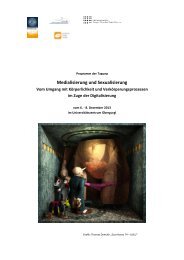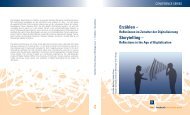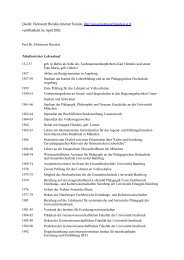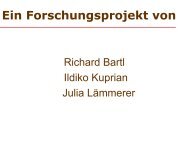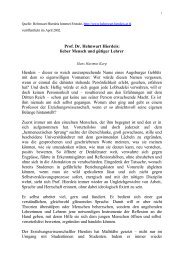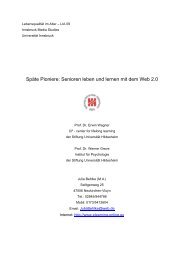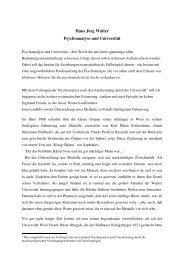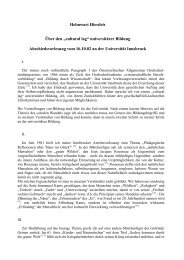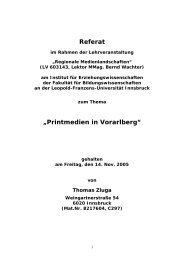Download pdf - Universität Innsbruck
Download pdf - Universität Innsbruck
Download pdf - Universität Innsbruck
Sie wollen auch ein ePaper? Erhöhen Sie die Reichweite Ihrer Titel.
YUMPU macht aus Druck-PDFs automatisch weboptimierte ePaper, die Google liebt.
30 Volker Grassmuck<br />
strengthened anti-sharing measures like SOPA and ACTA, the force of the resistance selforganised<br />
by the global networked citizens who do not want to let the potential of the<br />
Sharing Turn be crushed is astounding.<br />
Conclusions<br />
This paper does not pretend to present a systematic mapping of the socio-cultural practices<br />
emerging in the Sharing Turn nor a comprehensive analysis of its dynamics. I hope,<br />
though, I have managed to share with you some of what I see as important elements for<br />
such a theory and will close with posing questions for further research.<br />
There seems to be something in the biological make-up and in the cultural history of mankind<br />
that makes us naturally inclined to share. Environmental conditions may be more or<br />
less favourable to this inclination being actualized. An abundance of opportunity to network<br />
and interact with others as presented by the digital revolution is clearly an enabling<br />
factor in the current Sharing Turn. The more the technology and the capacity and ability to<br />
utilize it are spreading, the more sharing practices become normalized. The break-down of<br />
a prevalent anti-sharing power structure, whether a dictatorial regime or a culture industry,<br />
also provides ample opportunity and motivation for commonality, sharing and cooperation<br />
to re-emerge. As we have seen in the example of Cairo’s Tahrir Square, as immensely useful<br />
as digital technology is, it is by no means a necessary pre-condition. Also when ideologies<br />
of greed are discrediting themselves by showing their catastrophic effects, their mental<br />
hold over people breaks and makes them reconsider their ideas on competition vs. cooperation.<br />
If on- or offline public or commons spaces where communities of sharing can gather are a<br />
pre-condition then these must not be taken for granted. Zuccotti Park in New York, where<br />
Occupy Wall Street had set up camp, was cleared by police after two months. The Internet<br />
is subject to censorship, bans on access to it for alleged copyright infringers, threats to<br />
network neutrality and other of its fundamental principles. It is a matter of public policy to<br />
consider the effects of measures taken in these spaces on the Sharing Turn.<br />
The design of these spaces and the tools that communities develop for their interactions<br />
also warrant further attention. Belsky et al. (2010) have taken first steps in identifying<br />
features that are conducive to sharing in the exchanges between musicians and their audiences.<br />
These may be summarised as implementing and expressing trust and authenticity,<br />
transparency, empathy and solidarity, reputation-building, generosity and fairness.<br />
These values themselves need to be looked at more closely. E.g. altruism is often mentioned<br />
as a driving force of sharing. Like sharing and cooperating, altruism has become a<br />
popular research object in evolutionary genetics and neuroscience. But looking at one of<br />
the most comprehensive empirical studies of the motivations in the free software community<br />
(Ghosh et al., 2002, Figure 35 in Part IV: Survey of Developers) do we really find a



